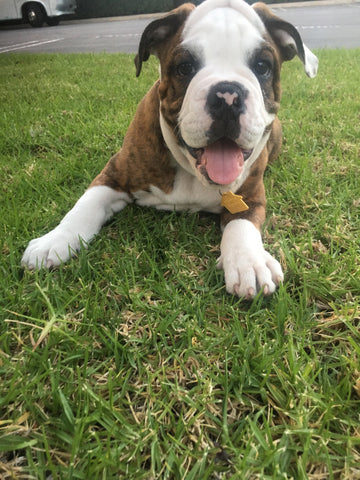When to Begin Puppy Training in the house
![]() Reading Time:
Reading Time:
Life In The Dog Den
Dogs are naturally clean animals. As soon as they are able to toddle out of their nests and away from their mother (about 4 to 5 weeks old) they begin to eliminate (urinate and defecate) away from the nest. Prior to this, the mother is able to control where and when they go to the bathroom.
Dogs have the natural tendency not to eliminate in what they perceive as their den area. When puppies are young, they cannot hold out for long periods of time. But once they are old enough to crawl and explore they want to eliminate away from where they sleep and nurse. Most puppies need to urinate every 45 to 60 minutes, a few minutes after waking up and eating, and about 20 minutes after drinking. In young puppies, bowel movements occur 5 to 6 times per day; after waking up in the morning, about half hour after meals and when he/she gets excited or scared. Puppies 3 to 5 months old should be able to make it through the night without urinating or defecating.
Our goal is to teach our puppies that the house is his or her den area. It is best for puppies to learn to eliminate directly outdoors, but if this is not possible we can designate a specific place in the house where the dog will use a paper or potty-pad to urinate and defecate.
You should establish a daily routine taking into account the times mentioned above. Be consistent in meal and exercise times. Puppies up to twelve weeks old need 3 to 4 meals per day, while puppies 3 to 6 months old need 2 or 3 meals per day. Take your puppy to the designated elimination area frequently. Depending on age and activity your puppy will need to go out every 30 minutes to 2 hours. Bring your puppy to outside location (or paper if must paper train) and encourage him/her to eliminate. Wait until the pup is finished and give small food reward.
How Old Should Your Puppy Be Before You Begin House training?
It is a good idea to start as early as possible. You should start seeing the results after your puppy is 14 weeks old, since it is at this age that puppies start controlling when and where they will urinate and defecate. It is important to start training as early as possible because, although at this stage your dog does not have much control, he/she will start learning what he/she is supposed to do. Training before 14 weeks of age is a pre-training for your dog. Once he/she has the ability to control when and where he/she will defecate, it will be much more easy to continue with the training.
If your puppy is younger than 14 weeks, be sure to keep her as clean as possible as you begin the process. Your puppy will make mistakes and sometimes it might get messy. And remember to keep harsh words to a minimum. Never yell at your puppy. And never, ever hit him/her. This would be akin to hitting a human baby for wetting the bed. You can also use anti-chew dog bed Experiences at this young age will shape your dog for the rest of his/her life, for this reason it is important to teach him/her with positive reinforcement instead of not negative reinforcement. When your dog does what you want, praise her enthusiastically. When they don't, keep at it until they do. Training them is your responsibility. Your dog wants to please you more then anything. You just have to let them know what's expected of them. Before 14 weeks of age, I wouldn't recommend scolding them at all.
This is your chance to bond with your puppy. Once that bond is achieved through love and attention, your puppy, and subsequently your grown dog, will follow you to the end of the earth! Remember that dogs are incapable of human emotions like spite. They will never mess on purpose.
















